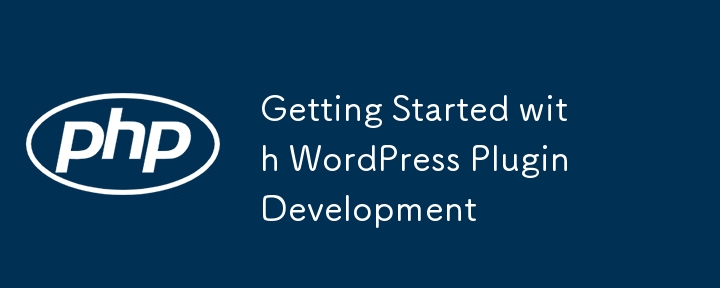Home >Backend Development >PHP Tutorial >Getting Started with WordPress Plugin Development
Getting Started with WordPress Plugin Development
- 王林Original
- 2024-07-23 14:17:241222browse

Getting started with WordPress plugin development can open up a world of possibilities for customizing and enhancing WordPress sites.
Whether you're looking to create a small utility plugin or a complex feature-rich plugin, understanding the basics is crucial. Here’s a guide to help you begin your journey into WordPress plugin development.
Understanding WordPress Plugin Development
Plugins in WordPress are tools to extend the functionality of your WordPress site. They can be as simple as changing a few lines of text on your site or as complex as implementing an entire eCommerce system.
The key to successful plugin development is understanding WordPress core functionality and how to interact with its API and hooks system.
Prerequisites for Plugin Development
Before you start developing a plugin, ensure you have a solid foundation in the following areas:
- PHP: WordPress is built on PHP, so a strong grasp of PHP is essential.
- HTML/CSS: For designing plugin settings pages and modifying front-end styles.
- JavaScript: Especially if your plugin involves interactive features.
- MySQL/WordPress Database Structure: Useful for plugins that interact directly with the WordPress database.
- Local Development Environment: Tools like XAMPP, MAMP, or a Docker-based environment like LocalWP are necessary for testing your plugin locally.
Setting Up Your Development Environment
- Install a Local Server: Use XAMPP, WAMP, MAMP, or LocalWP to set up a local WordPress environment.
- Install WordPress: Follow the standard WordPress installation process on your local server.
- Prepare a Code Editor: Use a code editor like Visual Studio Code, PhpStorm, or Sublime Text for writing and editing your plugin code.
Step-by-Step Guide to Creating Your First Plugin
Step 1: Create a Plugin Folder and File
- Navigate to your WordPress installation directory, and find the wp-content/plugins folder.
- Create a new folder for your plugin, e.g., my-first-plugin.
- Inside this folder, create a PHP file for your plugin, e.g., my-first-plugin.php.
Step 2: Write the Plugin Header
Open your my-first-plugin.php file and add the following header to tell WordPress that it’s a plugin file:
<?php /* Plugin Name: My First Plugin Plugin URI: http://yourwebsite.com/my-first-plugin Description: This is my first WordPress plugin. Version: 1.0 Author: Your Name Author URI: http://yourwebsite.com */
Step 3: Write a Simple Function
Below the plugin header, write a simple function to see how plugins can modify WordPress behavior. For example, let’s make a plugin that modifies the content of all posts:
function modify_content($content) {
return $content . '<p>This is added by my first plugin!</p>';
}
add_filter('the_content', 'modify_content');
Step 4: Activate Your Plugin
- Go to the WordPress dashboard.
- Navigate to Plugins > Installed Plugins.
- Find "My First Plugin" and click Activate.
Once activated, navigate to any post on your site, and you should see the new text appended to the content of each post.
Best Practices in Plugin Development
- Follow WordPress Coding Standards: Make sure your code adheres to the WordPress Coding Standards.
- Security: Always sanitize, validate, and escape user data to prevent security vulnerabilities.
- Localization: Make your plugin translation-ready by using localization functions.
- Testing: Test your plugin in various environments and WordPress configurations.
- Documentation: Maintain clear documentation to help users understand how to use your plugin.
Wrapping Up
Starting with WordPress plugin development can seem daunting, but breaking it down into manageable steps can simplify the process. By creating your first plugin, you gain the foundation to explore more complex features and contribute valuable tools to the WordPress community.
The above is the detailed content of Getting Started with WordPress Plugin Development. For more information, please follow other related articles on the PHP Chinese website!

